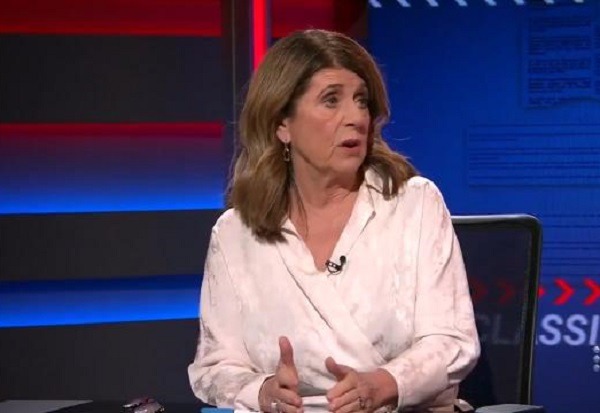Sports journalist Caroline Wilson caused some disharmony this week, after her comments about two St Kilda players, Seb Ross and Tim Membrey, hit a nerve in the AFL world.
Wilson said fans had a right to be upset with the two players for missing their team’s round 13 clash with Adelaide in Cairns. The players had made the decision to head home ahead of the game; Membrey’s wife was due to give birth and Ross’ wife was at home with newborn twins.
Speaking on Footy Classified on Wednesday night, Wilson said she would not back away from her comments and believed St Kilda fans had a right to be upset. In her view, Ross and Membrey’s choices had seemed irresponsible. She made the point that it wasn’t just her making this argument, she had been hearing it from people at St Kilda and in wider circles, who were also unhappy with the players’ decisions.
“I’m not backing away from it when I saw I think a lot of people were having the conversation anyway, clearly it reached my ears last week when I brought it up. I knew St Kilda people were unhappy,” she said on Wednesday.
“I had an opinion that St Kilda fans had a right to be disappointed. I’m standing by that opinion. I think the pile on has been pretty shocking to be honest. Some of it’s been personal.”
It must be acknowledged that while Wilson chose to voice these concerns in the media, her attitude towards the responsibilities of fatherhood is an attitude that many Australians hold. As she said, it was also a view she’d heard others express privately.
We live in a country where a pervasive stigma around fathers who leave the workforce to care for their young children exists, and ideas around the ‘correct’ way to be a father are entrenched in traditional expectations. In the sporting world – where men are often paid high salaries to play professionally in their chosen field – these gendered expectations are real.
We also live within social structures in Australia that actively prevent men from taking time away from their work when they have a baby, and where it is more conducive for mothers, in many cases, to take on those responsibilities.
In Australia, our government’s paid parental leave scheme entrenches gender stereotypes by adhering to ‘primary’ and ‘secondary’ caregiver labels. It provides up to 18 weeks at the national minimum wage to ‘primary’ carers, who much more often than not, are women. Men are not incentivised to stay home with their new baby, and as a result, in most circumstances, they don’t.
This system establishes a pattern that so many families continue for years and years. An expensive childcare system that disincentivises women from working full-time also contributes to the expectations we hold about fatherhood.
Responding to the media whirlwind, Seb Ross released a statement on Wednesday, explaining his decision to head home to his wife and children, knowing all the while there was a risk he’d miss the game.
“Although I was torn between my club obligations and my family obligations, it was a risk I was willing to take,” Ross said. “I knew I needed to be at home to help my wife Marnie with our five-week-old twin boys Vinny and Henley and daughter Charlotte.”
“This was never to be about me not honouring my commitment to the St Kilda Football Club — the club that I’m committed to and am proud to represent. This was simply me supporting what I cherish most, my family.”
In that statement, Ross speaks very eloquently about the constant push and pull between being a professional athlete and a young father. He says he knew there was a chance he’d miss the game, but when it came down to it, it was his family that needed to come first. His sentiments speak to the dilemma of so many fathers in Australia, who want to give more to their family, but are often prevented, and actively discouraged, from doing so.
Every year, 1 in 7 women in Australia who give birth experience a period of postnatal depression. It’s an enormous period of adjustment when parents need to come to terms with all the changes having a new baby brings. Normalising men’s choices when they prioritise their role as a father, especially given the structural barriers that stand in their way, is crucial to shifting the status quo.
Speaking on Footy Classified, Wilson offered sympathy for mothers of young children. As the only mother on the panel, she said she knew how tough that early period of parenthood is, and she wasn’t trying to take away from that.
Being supportive of new mothers is something most Australians would acknowledge is important. But having social structures that offer men the opportunity to be present fathers, who take on caring responsibilities, is just as essential. And it would go a long way to progressing gender equity in this country.


